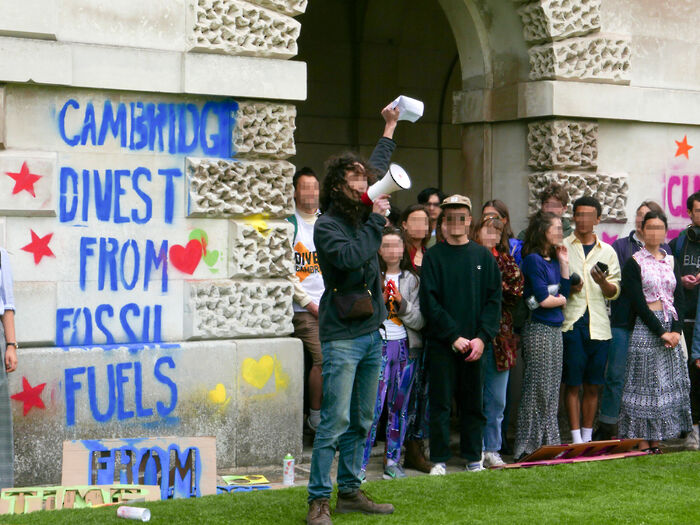Students confront Toope on divestment and democracy
The meeting provided a chance for students to probe the vice-chancellor on commitments made in the open meeting last March

Vice-chancellor Stephen Toope held a second open meeting today, where he responded to questions posed by Cambridge staff and students, following the first open meeting in March which was in the midst of the UCU-led staff strikes.
The meeting at Mill Lane Lecture Theatres, chaired by CUSU Education Officer Martha Krish, focused on the University’s investment strategy and its internal democratic structures, as well as specific measures that it might take regarding racial justice and drinking societies. Graham Virgo, the University’s pro-vice-chancellor for education, was also on the panel.
There are “legitimate, serious concerns about the evolution of higher education in the United Kingdom.”
In Toope’s opening remarks, he recognised that there were “legitimate, serious concerns about the evolution of higher education in the United Kingdom.”
Krish opened the discussion with follow-up questions from the previous open meeting on the opacity of the University in its approach to issues such as divestment and staff pay.
With the University Council expected to reach a decision on Monday 21st May over whether to divest its endowment from indirect investments in fossil fuel companies, several questions to the vice-chancellor focused on this issue. Toope emphasised the potential implications of divestment, arguing that University was only a “small investment fund,” and that the effects of taking a “risk” and changing the investment of the University’s endowment could have unpredicted consequences.
At the first open meeting, Toope did not take a clear stance on divestment. The vice-chancellor emphasised that power did not lie with him, but rather with the University’s governing body, and refused to confirm his own personal stance or policy views on the issue.
The divestment working group’s report is not yet public, and Toope maintained that as a member of the University Council, he was “under the obligation of confidentiality,” and could neither hint at the report’s content, nor to his own personal stance.
He remains “under the obligation of confidentiality” not to voice a personal stance on divestment.
Toope highlighted his support for a “light touch” approach with the UK government’s controversial Prevent policy, and emphasised that no one had been referred by the University’s Prevent committee to government security services. However, he did point out that the University was obliged to report students if it was necessary under the Prevent duty.
Krish asked Toope what procedures the University would implement to ensure there are posts specialising in issues such as decolonisation. The vice-chancellor has also been supportive of decolonising the University’s curriculum, previously saying he thinks it holds “a lot of value”. Toope said that currently he “talks to heads of department and expresses concerns about these issues”, but “ultimately it all happens from the bottom up.”
‘Decolonising the Curriculum’ campaigns have been organised by students in several faculties this year, and has been a central focus of the CUSU BME Campaign.
Virgo showed enthusiastic support for decolonisation, emphasising that work must be done by everyone, not just BME academics, to ensure this, and make education “more inclusive”
The decision-making process of the University, as well as issues surrounding accountability and ways for institutional processes to be made more democratic, was discussed, with Krish suggesting that many aspects of the current system made students feel “blocked out” of the change process.
Toope recognised that the formal decision-making structures were “really formal and really constrained”, and expressed a desire to “figure out if there are ways we can use more informal structures to drive change.” While he did not commit to further open meetings, he did show an enthusiasm to ensure more communication between the University and its students.
 Features / Should I stay or should I go? Cambridge students and alumni reflect on how their memories stay with them15 December 2025
Features / Should I stay or should I go? Cambridge students and alumni reflect on how their memories stay with them15 December 2025 News / Cambridge study finds students learn better with notes than AI13 December 2025
News / Cambridge study finds students learn better with notes than AI13 December 2025 News / Uni Scout and Guide Club affirms trans inclusion 12 December 2025
News / Uni Scout and Guide Club affirms trans inclusion 12 December 2025 Comment / The magic of an eight-week term15 December 2025
Comment / The magic of an eight-week term15 December 2025 News / Cambridge Vet School gets lifeline year to stay accredited28 November 2025
News / Cambridge Vet School gets lifeline year to stay accredited28 November 2025









